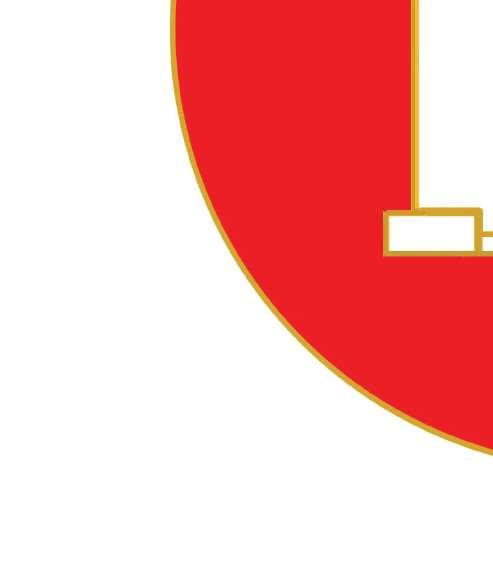






TAKE A PIECE OF THE ICELANDIC SAGA HOME WITH YOU

edesignisclassy,basedon traditionalsymbolsand has roots inIcelandic history.
VeraDesign wasestablished onthe foundation ofajewellery linebyGuðbjarturÞorleifsson,whohas designeda large varietyofjewelleryin thelast70years. Hisdesignhas roots inIcelandic history and VeraDesign’s teamisproudtobuildon his tradition.
Weaimtodesign timelessandunique piecesofjewelrythatcanbepasseddownthrough generations.
VeraDesign’s jewelleryissoldin24stores inIcelandandonein theFaroeIslandsandon their website www.veradesign.is fromwhereitisshippedworldwide.





Lillian Heimisdottir is a writer and poet residing in Barcelona.
Eleanor Jiménez is a writer and professor of classical and contemporary literature from Barcelona (web).
Christian Barragan is a graduate from California State University Northridge. Raised in Riverside, CA, he aims to become a novelist or editor. He currently reads submissions for Flash Fiction Magazine. His work has appeared in the Raven Review, the Frogmore Papers, and Caustic Frolic, among others (web).
Andrew Rucker Jones is a former IT dweeb and American expatriate living in Germany with his Georgian wife and their three children. He has had the honor of being published in The Four Faced Liar, Dark Matter Magazine, and Tales from Fiddler’s Green, among many others (web)
Jennifer Leigh Kiefer (she/they) is a semi-nomadic writer and stage manager currently based out of Hartford, CT. Previous work can be seen in Café Lit, Rat’s Ass Review, Scarlet, and Academy of the Heart and Mind (web)
Mark Strohschein is a Washington state (U.S.) poet who lives on Whidbey Island. His poems have appeared in Flint Hills Review, Bryant Literary Review, Main Street Rag, Barren Magazine, Lips Poetry Magazine, The Milk House, The Big Windows Review, in anthologies, and elsewhere. His work is forthcoming in Assignment Literary Magazine (web).
Oisín Breen is an Irish poet, doctoral candidate, and journalist. He is a multiple Best of the Net nominee and Erbacce Prize finalist, is published in 128 journals in 24 countries. Breen’s third collection, The Kergyma, is slated for 2025 (Salmon) (web).
Niveditha K Prasad is an undergraduate student and has previously published in Café Dissensus and RIC Journal. She runs a weeklyish Substack newsletter on where you can find some of her scribblings on cinema, culture and literature (web).
Lawrence Winkler is a retired physician, traveler, and natural philosopher. His métier has morphed from medicine to manuscript. His writings have previously been published in The Montreal Review and many other literary journals. His books can be found online at (web).
Ayah Al-Masyabi is a 17-year-old junior living in Colorado. She tackles her creative endeavors through writing, visual art, and, more recently, audio and video. Human stories and the narratives around soccer often influence the pieces she crafts (web).
Erik N. Patel is a writer and digital nomad (web).
Heimir Steinarsson is an Icelandic typographer and linguist.
Coverphoto: shaiith / Adobe Stock
The Mantelpiece (ISSN 2988-9405) © www.themantelpiece.org
Editor: Lillian Heimisdottir (lillian@themantelpiece.org)
Publisher: Markmal ehf., Hverafold 1-3, PO-Box 12066, 132 Reykjavik, ICELAND
Magazinelayoutandwebpage design: Heimir Steinarsson
Editorial
LillianHeimisdottir 4 TheHeatIsOn
Literature
EleanorJiménez 5 FolkloreReimagined
Fiction
ChristianBarragan 6 IntheMargins
AndrewRuckerJones 10 RiverMan
JenniferLeighKiefer 20 TheQueenofMyHeart
Poetry
MarkStrohschein 9 WoodDucksattheLost Lagoon
OisinBreen 13 LessonsfromthePast NivedithaKPrasad 24 MyMotherSings aBharatiyaarSong
Travel
LawrenceWinkler 14 FaraWay- Rotuma
Essay
AyahAl-Masyabi 22 TheWeightofUncertainty
Commentary
ErikN.Patel 25 EffortlesslyPerfect The Light Side
27 RoadRage
Submissions: The Mantelpiece is open to unsolicited submissions of fiction, non-fiction and poetry. We consider all submissions for both our website and online magazine. Please familiarize yourself with our submission guidelines at www.themantelpiece.org/submissions and send your work to submissions@themantelpiece.org The Mantelpiece - Literary Magazine. Issue 14, August 2024. Copyright 2024 The Mantelpiece. All artwork and literature contained in this publication are copyright 2024 to their respective creators. The ideas and opinions expressed within belong to the respective authors and artists and do not necessarily reflect those of the editors. None of the contents of this publication may be reprinted without the permission of the individual authors or artists
The summer of 2024 has been relentless. As temperatures climb into the triple digits across much of the globe, the heat is not just a physical sensation; it is a harbinger of more profound andpervasivechanges.Scientistshavelong warnedusthatclimate change wouldbring more intense and frequent heatwaves, and now we are living in that reality. The heat is on, quite literally,and the environmental crisismirrorsanequallyscorchingpolitical climate that threatens to engulf the world. In cities from Phoenix to Paris, people are grappling with unprecedented heat. Air conditioning units hum tirelessly, water supplies dwindle, and infrastructure strains under the pressure. Wildfires rage with newfound ferocity, and the once predictable rhythms of nature are thrown into disarray.Thisoppressiveheat,adirectconsequence of our failure to address climate change,servesasametaphorfortheincendiary political atmosphere that has taken hold globally.
Consider the war between Russia and Ukraine. What began as a geopolitical conflict has spiraled into a full-scale war, drawing in neighboring countries and threatening global stability. The resulting humanitarian crisis and the economic ripples are reminiscent of a forest fire that, once started, cannot be easily contained. Each diplomatic misstep is like a gust of wind,fanning theflames higherand hotter. Meanwhile, the decades-long conflict between Israel and Palestine has erupted once more with renewed intensity. Bombings, ground assaults, and the loss of civilian lives play out against a backdrop of deep-seatedhistoricalgrievancesandpolitical failures. This conflict is not unlike the scorching heatwaves: predictable in their recurrence, yet devastating each time they arrive.The world watches, much as it does withthewildfires,withamixofhorrorand helplessness, knowing that the root causes are complex andthe solutions, elusive.
In Europe, the rise of ultra right-wing parties adds another layer to this global fever. Fueled by fears of immigration, economic uncertainty, and a desire to return to anidealizedpast,thesepartiescapitalizeon the same sort of shortsighted thinking that has driven environmental degradation.The politicalrhetoricisasheatedasthesummer sun, sparking divisions and threatening the unityoftheEuropeanUnion.Thistrendtowardsnationalismandisolationismmirrors therefusaltocooperategloballyonclimate initiatives, each country choosing shortterm gains over long-term stability.
Across the Atlantic, the United States is in the throes of a fierce presidential race.
“To cool the physical world, we must simultaneously strive to temper the escalating tensions that define our political andsociallandscapes.”
The political climate is as blistering as the Mojave Desert, with candidates from all sides stoking the fires of division and discontent.The battlefor thesoulofAmerica is being fought in a crucible of partisan rhetoric, misinformation, and social media-fueled outrage. The polarized electorate reflects the broader global tensions, each side entrenched and unwilling to budge, much like the stubborn high-pressure systems that trap heat and smog over cities.
Just as the physical heatwaves necessitate urgent action to mitigate their impact, so too does the political climate demand immediate and thoughtful responses. Addressing climate change requires a global
effort, with countries setting aside differences to work towards a common goal. Similarly, resolving international conflicts and political divisions requires diplomacy, empathy, and a willingness to see beyond immediate gains.
The heat ison in every conceivable way. The sweltering temperatures we endure today are not merely an inconvenience but a stark symptom and potent symbol of the broader crisis that looms over us. As we navigate these treacherous and uncertain times, it becomes increasingly clear that the solutions to our environmental and political problems are deeply interconnected. The physical heat waves that blister our landscapes are mirrored by the fiery political rhetoric and conflicts that scorch our global community.Addressing climate change necessitates more than just technological innovation or environmental regulation; it requires us to tackle the heated divisions and ideological rifts that threaten to consume our societies.
To cool the physical world, we must simultaneouslystrivetotempertheescalating tensions that define our political and social landscapes. The wildfires raging through forests and the floods devastating communities are not isolated events but are intrinsically linked to the political upheavals and social unrest that dominate headlines. Our approach to these crises must be holistic, recognizingthatenvironmentalsustainabilityandpoliticalstabilityaretwosidesofthe same coin.Onlythroughacollectiveeffort, where nations set aside their differences and work towards a shared vision of a sustainable and peaceful future, can we hope to find respite from the scorching reality we face.This shared sense ofpurposemust drive usforward, fosteringcooperation and understandingonanunprecedentedscale.It is through this unity and common goal that we can begin to cool both the literal and figurative temperatures, ensuring a livable planetand aharmoniousglobalcommunity for future generations. ☐ L.H.
Eleanor Jiménez
Throughout the ages, mythology and folklore have been fundamental to storytelling, acting as vessels for cultural transmissionandexploringthe depths of human experience. These narratives, which often delve into themes such as morality, identity, and the supernatural, have been preserved and passed down across generations, adapting to the needs and contexts of different eras. In modern literature, authors frequently draw upon these ancient stories, reinterpreting and reimagining them to address contemporary issues and resonate with current audiences. This essay explores the influence of mythology and folklore in modern literature, examining how these elements are used to enhance narrative depth, explore complex themes, and connect with readers across different cultures and eras.
The roots of mythology and folklore are deeply embedded in the earliest forms of human storytelling, serving as fundamental frameworks through which ancient societies understood and navigated the world around them. Mythologies were often developed to explain the origins of the universe, the workings of nature, and the complex dynamics of human existence. These stories were integral to the cultural and religious life of communities, providing a shared narrative that helped to unify and preserve collective identities.
In ancient civilizations, myths were not merely stories but were often regarded as sacred truths, deeply intertwined with religious practices and societal norms. For instance, Greek mythology, with its pan-
theon of gods and epic tales, was central to Greek culture, influencing everything from daily rituals to artistic expressions. Similarly,theepicsofHomer,suchas“The Iliad” and “The Odyssey,” are not only literary masterpieces but also crucial sources of moral and historical understanding for the Greeks.
Folklore, on the other hand, encompasses the traditional beliefs, customs, and stories



ues, fears, and aspirations of the people, serving as a mirror to the societal psyche.
As societies transitioned from oral to written traditions, many of these myths and folktales were recorded, preserving them for posterity and allowing them to spread across cultures and epochs. The Roman poet Ovid’s “Metamorphoses,” for instance, is a compilation of mythological tales that has influenced Western literature profoundly. In the medieval period, folklore and mythology continued to play a pivotal role,oftenmerging with Christian narratives,asseeninthe legendsof saints and theArthurian myths.










of a community, passed down orally through generations. Unlike mythologies, which often have a more structured narrative and religious connotations, folklore is more fluid and encompasses a wide range of tales, including fables, fairy tales, and legends.These stories often reflect the val-
WiththeadventoftheEnlightenmentand the rise of scientific thinking, the role of mythology and folklore began to shift. These stories were increasingly seen not as literal truths but as cultural artifacts that could provide insight into the human condition and societal structures. This period also marked the beginning of a more systematic collection and study of myths and folklore, with scholars like the Brothers Grimm and Andrew Lang compiling volumes of folktales that have since become literary classics.
In the 19th and 20th centuries, the Romantic movement reignited interest in folklore and mythology, emphasizing the emotional and spiritual aspects of these narratives. Romantic poets like William BlakeandSamuelTaylorColeridgedrew inspiration from mythological themes, exploring the mystical and the sublime in theirworks.Thisperiod also sawthe emergence of modern mythology, where new narratives were created, often influenced by the technological and social changes of the time.
The 20th century brought a more critical and analytical approach to mythology and folklore, with the development of fields such as anthropology, psychology, and literary criticism.ScholarslikeCarlJungand Joseph Campbell explored the psychological and archetypal aspects of myths, while others examined their sociocultural functions and narrative structures.













In contemporary literature, mythology andfolklorecontinuetobeavibrantsource of inspiration. Modern authors frequently reinterpret these ancient stories, infusing them with new meanings and perspectives to address contemporary themes and concerns. This ongoing dialogue between the past and present highlights the enduring power of these traditional narratives and their ability to adapt to the changing contexts of human society.
Thus, the historical context of mythology and folklore reveals a rich tapestry of narrative evolution, showcasing how these stories have shaped and been shaped by the cultures that preserve them.As foundational elements of human storytelling, they continue to influence modern literature, providing a lens through which we can explore timeless human themes and contemporary issues.
Oneof the mostcompellingaspectsof mythology and folklore in modern literature is their exploration of timeless themes,
such as identity and transformation. For instance, Neil Gaiman’s “American Gods” weaves a tapestry of ancient gods and moderndeities,exploringhowthesebeings adapt and survive in contemporary America. The narrative delves into issues of identity, belief, and cultural change, using mythological figures to symbolize broader societal transformations.
Similarly, Madeline Miller’s “Circe” reinterprets the story of the minor Greek goddess, transforming her from a peripheral character in Homeric epics into a protagonist grappling with issues of identity, power, and self-determination. By giving voicetotraditionallymarginalizedcharacters, modern retellings like “Circe” offer freshperspectivesonancientmyths,highlighting their relevance to contemporary discussions on gender and autonomy.
Another prevalent theme in mythology and folklore is the dichotomy between good and evil, often portrayed through epic battles and moral dilemmas. Modern works such as Rick Riordan’s “Percy Jackson” series and J.K. Rowling’s “Harry Potter” series reinterpret these archetypal conflicts within contemporary settings. These narratives not only entertain but also provide frameworks for readers to navigate their own moral and ethical landscapes, reflecting the enduring power of mythological storytelling to influence personal andcultural identity.
Mythology and folklore are deeply intertwined with cultural identity, often embodying the values, beliefs, and historical experiences of a community. Modern literature frequently blends diverse mythological traditions, creating narratives that reflectthecomplexitiesofglobalizedcultural identities. For example, Salman Rushdie’s “TheSatanicVerses”drawsonIslamicmythology, infusing the narrative with magical realism to explore themes of migration, identity,andculturaldislocation.Similarly, Chitra Banerjee Divakaruni’s “The Palace of Illusions” offers a feminist retelling of the Indian epic “Mahabharata,” reimagining the story from the perspective of Draupadi, a key female figure.
These works not only preserve and celebrate cultural heritage but also critically engage with it, challenging traditional narratives and offering new interpretations. In doing so, they contribute to a broader dialogue on multiculturalism and the fluidity of cultural identities in the modern world.
Beyond their thematic significance, mythology and folklore serve as powerful literary devices in modern literature.Authors use these elements to create allegories, deepen symbolism, and enhance narrative complexity. The use of mythical creatures, archetypal characters, and fantastical settingsallowswriterstoexploreabstractconcepts and societal issues in a metaphorical way.
Forinstance,theuseofthehero’sjourney archetype, as discussed by Joseph Campbell, is prevalent in modern storytelling. This narrative structure, which involves a hero’s departure, initiation, and return, can be seen in countless works, from epic fantasy novels to contemporary dramas. It serves as a framework through which authors can explore personal and collective growth, the challenges of change, and the nature of heroism.



To illustrate the influence of mythology and folklore in modern literature, one can look at specific works and authors who have masterfully integrated these elements into their narratives.
Neil Gaiman’s “American Gods”
Neil Gaiman’s “American Gods” is a compelling blend of ancient mythology and modern storytelling. The novel features




gods and mythological figures from various cultures who struggle to maintain their relevance in contemporaryAmerica,a land dominated by new deities representing modern obsessions like technology, media, and consumerism. Gaiman uses these mythological characters to explore themes of belief, cultural change, and the identity crisis of a society caught between the past and the present. The character of Mr. Wednesday, an incarnation of the Norse god Odin, exemplifies the old gods’struggleforsurvival,whilenewgodslikeMedia and Technical Boy embody modern society’s shifting values and priorities.
Madeline Miller’s “The Song of Achilles” and “Circe”
Madeline Miller’s works, including “The Song of Achilles” and “Circe,” offer fresh perspectives on classical Greek myths. “The Song of Achilles” reimagines “The Iliad” from the viewpoint of Patroclus, exploring hisdeep bond withAchilles.Miller humanizesthese legendaryfigures,delving intothemesoflove,destiny,andthehuman consequences of war. This retelling brings anewemotionaldepthtothemyth,making itaccessibleandresonantforcontemporary readers.
In “Circe,” Miller gives voice to the titular character, a minor goddess and en-
chantress from Homer’s “Odyssey.”
The novel explores Circe’s journey from a marginalized figure in divine society to a powerful and self-reliant woman, examining themesof isolation, transformation, and empowerment. By focusing on Circe’s perspective, Miller not only revitalizes a well-known myth but also critiques and reinterprets traditional gender roles within mythology.
Chimamanda Ngozi Adichie’s “Purple Hibiscus”
Chimamanda NgoziAdichie’s “Purple Hibiscus” incorporates elements of Igbofolkloreandspirituality.Thenovel tells the story of a young girl, Kambili, growing up in Nigeria under the strict rule of her authoritarian father. Throughout the narrative, Igbo cultural traditions, including folklore and beliefs,arejuxtaposedagainstWestern influences, highlighting the protagonist’s internal conflict and the broader theme of cultural identity. Adichie uses these traditional elements to explore themes of oppression, freedom, and thesearch for personal and cultural identity.
Margaret Atwood’s “The Penelopiad”
Margaret Atwood’s “The Penelopiad” offers a feminist retelling of Homer’s “Odyssey,” focusing on Penelope and her maids. Atwood reimagines the events of theepic fromPenelope’sperspective,providinga voicetoher andthetwelvemaids whowerehangeduponOdysseus’sreturn. This novel critiques the patriarchal values inherent in the original myth and explores themes of power, gender, and justice. Through Penelope’s narration,Atwood addresses the silencing of women’s voices in classical literature, challenging readers to reconsider the traditional narratives.
Salman Rushdie’s “Haroun and the Sea of Stories”
Salman Rushdie’s “Haroun and the Sea of Stories” is a modern fairy tale that draws heavily on folklore and mythology. The novel tells the story of Haroun, a young boy who embarks on a fantastical journey to restore his father’s storytelling abilities. The narrative incorporates elements from various mythological and folkloric traditions, blending them into a rich tapestry that explores the power of storytelling and
imagination. Rushdie uses this fantastical framework to address issues of censorship, freedom of speech, and the importance of narrative in shaping reality.
These examples illustrate how modern authors utilize mythology and folklore not only to enrich their narratives but also to engage with contemporary issues. By reinterpreting these ancient stories, they offer new insights into human nature and society, demonstrating the timeless relevance andadaptabilityof thesetraditionaltales in modernliterature.















In conclusion, mythology and folklore continue to exert a profound influence on modern literature, providing rich narrative frameworks and exploring enduring themes.Theseancientstoriesresonatewith contemporary audiences because they address universal human experiences and emotions,fromthesearchforidentitytothe struggle between good and evil. As modern authors reinterpret and reinvent these narratives, they not only preserve cultural heritage but also challenge and expand our understanding of these timeless tales. In an increasinglyglobalizedworld,theblending and adaptation of mythological traditions reflect the dynamic and evolving nature of cultural identity, demonstrating the enduring relevance of mythology and folklore in literature. ☐
needed sleep. As much as I tried, I could not drown out nature’s wailing. I lamented choosing this room, right next to his, but I knew everyone would expect me to stay here. We’re creatures of habit,andIhadalwaysusedthisroom.Idoubtedanyonehadeven openedhisdoor sincetheincident, and I wasn’tabout to.Butwhy shoulditmatterthatI’mnexttohisroom?It’snotlikethat’swhere it happened.
The sunroom was my spot of preference for writing. It was secluded enough for privacy but also offered a picturesque view of the property. It featured a typewriter and numerous charming anachronisms. I preferred the intimacy of typing on actual paper for a first draft. After typing for as long as I could, I’d denote in the margins anything I should cut out or otherwise change. This processmadeitmucheasiertonotwastetimewithmediocreideas or characters.
You can’t sleep like this.
Isqueezedthepillowagainstmyface,butthesoundsonlygrew more intense. My phone rang, jolting me out of my stupor.
“I’ll just leaveit.”
Ring.
“Surely a wrong number.”
Ring!
“Leaveme alone!”
RING!
The sounds wouldn’t cease to berate me. It was my first night back at the writer’s residence in months, and the elements outside relentlessly assaulted my senses. Rain and wind danced outside my fragile window, threatening to burst it open. The other writers weren’t scheduled to arrive until the end of the week. I took it upon myself to come beforehand, hoping to spend some time alone, but I overestimatedmy initial enthusiasm.
“What a cold welcome.”
In my absence, I’d grown much more accustomed to inner-city life, where I’d had much success with my writing career. My hometown of Stromwood wasn’t tiny, but these backwoods were far from the city center. It wasn’t until recently that Ieven considered coming back, especially after the incident here. I wondered how the others would greet me when they arrived. Even though I wasn’tthere whenithappened,Iknewsome ofthemblamedme.I didn’t see any of them rushing to help either.
Your mind is tense from the struggles of the day. Find an outlet. In truth, I’d been longing to write something all day. I had several ideas I planned to explore, and I always feared waiting too long before starting. As a result, I never stopped writing until I was satisfied that I had exhausted my inspiration. But I urgently
Ifinallygotup, throwingthesheetsoffmycoldbody.Igrabbed my phone from the nightstand and raised it to my face. No one. No indication I had received a call. I put it down, but the ringing didn’t stop. I couldn’t tell if the sound was real or just a product of my fatigue.
Writing will make you feel better. Empty your mind.
I led myself out of my room and shut the door behind me. I felt a pang of embarrassment as the ancient hinges creaked in agony, even though I knew no one else was in the house.
Ring!
Ring… …ring…
The awful continuous ringing grew softer as I moved down the hallway.
“I had nothing to do with that anyway....”
I ran several ideas through my head as I neared the sunroom, hoping to keep myself busy. Of course, at this hour there would likely be nothing but darkness there. He also preferred that spot, but I doubt we were ever in there at the same time. It hardly surprised me that this was where he chose to do it. Apparently, the owners had cleaned the scene before anyone else arrived. It took some light remodeling, but not even a stain remained.
I turned the knob and pushed the beckoning door open.
I was wrong about the darkness. The moonlight illuminated the space fairly well. I immediately recognized the typewriter on the

desk as the one I used to use. The windows reflected the brilliance ofthemooninto my face asI swayed underthe doorframe.Infront of the desk stood a tall, pale figure staring at me with unclosing eyes. Incisions of various sizes lined its haggard coating. I froze.
Why didn’t you ever answer?
The apparition curled its unusually long arms. It was only then that I noticeda small knifelodged in the creature’s wrist.The bony hand below the blade twitched as a thick dark fluid ran down its body onto the floor. It was a pitiful sight. I rubbed my eyes, but the figureremained.IknewIhadtobehallucinating.WhatwasIthinkingcoming here this late?

All my desire to write suddenly vanished. The only important thing was to get some sleep. I could just save my writing for the morning when I’d feel better.


Mark Strohschein

I wasn’t one of your stories to forget about.
“This isn’t real.You’renot here.”
Icarefullybackedoutofthesunroomandclosedthedoor.Ishivered, trying to get the image of those familiar uncanny eyes out of mymind.Therewasnopointinturningonthelightsinthehallway, I’dhave to walk back to turn them off.

Ifeltmywaythroughthecorridor,almostslippingonaredpaste trailingbymyroom.InearlymadeittomydoorwhenIpickedupa faintglimmeroflight.Itwasn’tcomingfrommyroombutfromhis. Thehingesoftheopendoorcreakedasitswayedfromtheamassing breeze. The moonlight subtly brightened the inside of his room. It was barely enough to distinguish the apparition sitting at the edge of the bed. It peered at me with a wide, mournful expression.
You knew exactly what was going on.

I anxiously anticipated going back to my room.
You chose to have nothing to do with it.
I reached toward his door and swung it shut. What transpired in this room was none of my business.

Vancouver

Hidden in their prized alcove, their unlikely oasis of unlocked marsh water, two dozen wood ducks, chiseled, majestic cluckers, diving headfirst, flapping, swimming, nuzzling, feeding— as if performing unprovoked in a natural zoo exhibit.

I entered my room and plopped ontothe bed. Ring.
“Not again…” Ring! RING!
“Shut up!” RING!

Lightning struck just behind the house, filling my room with a hot white flash. For the split second before the light departed, I could see the apparition glowering at me from the front of my bed. Darkfluid from the creature’s injury dripped onto the bed frame.
I squeezed my pillow against the sides of my head, hoping to drown out the rest of the world.
Aren’t you going to answer?

I kicked at my bed sheets in desperation, knocking over the nightstand and my phone with it. A cold sweat overtook me. My pounding heart threatened to lunge out of my chest. I thought I’d goinsane if I spent onemoreminute awake.My bodytensedas the vitality of my muscles diminished with every convulsion. Finally, I conceded.



Why this marshland spared of winter’s entombment while its mother lagoon slumbers? It is moments like this that one engenders a kind of faith— to just accept the mystery of life for what it is— to relish the inexplicable.


The storm outside had ceased. I sat up. Nothing threatening remained in my presence, though the room was nearly pitch-black. Slowly, my breath steadied and my heart calmed. I rested my head on the damp pillow and savored the newfound silence. I waited for the last of my mental haze to dissipate so I could finally get some sleep. I opened my eyes again when I heard the steady sound of something dripping near my bed.
Ring! ☐




So let’s beat wings fanning frigid air, so alive, so alive, not questioning the impossibility of now, web feet trolling below swirling servile wakes of water, so unbelievably free.









Andrew Rucker Jones
When Eteri emerged from the university’s examination room, Soso waited for her under the Communist hammer and sickle on the wall. The concrete building’s dim halls eased the muggy, Mediterranean heat, yet sweat circled his armpits and dotted his shirt across his chest. He smiled as though smiling embarrassed him, but his presence calmed Eteri after an hour before a row of bespectacled, bald-pated professors sitting in judgment over her thesis. He stood a full head taller than her, and she drew his shoulders in around her when—always in private—he held her. Eteri extended her handsnow,andhetookthemwitha glance down the empty corridor.
“Eteri,” he said. He always addressed her first, as if she might not hear him otherwise. “How was it? Did you pass?”
“Bepatient,Soso. I’llknownextweek.”
Soso rocked from heel to toe and back, his gaze strafing the hall again. “They will pass you. They must. If they are honest men, they must.”
She touched his cheek, smooth from his twice-daily shaving, and he met her eyes again. He would be a stern father, but a warm grandfather, if she took him. Her neighbor Jamali had undergone the transition when his first grandson was born. It was not a transformation so much as a sloughing, when awareness of one’s own mortality scoured off the barnacles of parental anxiety.
“Eteri. I leave soon.”
“I know. I’m tired now. Will you walk me to the beach?”
“Yes.Yes. Of course.”
They left the university, nearly abandoned atthis hour,andwaded into the weak currents of pedestrians to and from the beach. They ambled past clod-like, concretehulksofCommunisthousingnear the university toward older buildings with ivystuccowork climbing the walls.
Eteriheldherheadhighandcaught men gazing at her from where they sat in cafés or huddled, shirtless, in clusters and spat sunflower seed shells into white-brown heapsonthepavement.ItamusedherSoso nevernoticedthemen’sattention,butSoso clasped his hands behind him and watched the ground as he walked, undeterred as a river.As far as she knew, he had asked her
out the first time he had laid eyes on her and had never stolen a thing in his life, be it an apple or a look at a woman.
“Eteri.IwillhavetojointheCommunist Party. My station demandsit.”
The rush of the surf carried over low roofsandaroundbusycorners.Ashipblew its horn, long anddeep.
“I’m reading Marx, but—” he leaned in, “—his ideas are impractical. I’ve thought and thought,but I can’t agree.”
“You don’t have to.”
Soso grunted. “Then how am I to join the Party?”
“It’s a white lie, Soso.You must.” “Eh.” He flicked both hands away from himself and frowned.
They reached the boardwalk at the edge of the Black Sea. She stopped before him and took his hands. “You are a student of the mariner’s academy. You can think of that as a kind of membership. Do you take every class theacademy offers?”
“No,no.Ofcoursenot.Thereareclasses for large ships and small ship, for dry freight andwet freight—”
“You take what you need and leave the rest.” She squeezed his thick hands. “Do you see, my love?”
Soso grunted again. “But I will be completely your husband if you will have me.”
His hands were moist in hers, and she wanted to drop them. “I need time alone. I’llgiveyoumyanswerthisevening,Soso.”
He nodded, bounced her hands, then let go and bustled off up the street alone.
She removed her shoes at the edge of the boardwalk, placed a foot on the hot stones, and transferred her weight. She had grown up here in Batumi, and her feet were well used to the stone beach, but the months sitting, reading, writing for her Master’sthesishadsoftened hersoles.The bluntedgesofstoneshalfasbigasherfoot pressed into hertendons.
She picked her way to the edge of the surf, slipping, balancing, grimacing. At least she didn’t have to wend through throngs of beachgoers this far from the city’s center. Lounge chair rental, popcorn vendors, and shoreline children’s rides drew most people farther in.
Shehitchedupherdressandwadedinto her knees. The warm, ebbing tide frothed around her and sucked at her calves.
A freight ship of the kind Soso would someday captain inched toward a skyline hazywith wetheat. Even now, its contours were cottoned and liminal, the kind of
gray that was more not-seeing than seeing. When they were little, Eteri’s older sister Ciala had once called a distant, indistinct ship like this one a “ghost ship.” She had claimedthesailorspilotedtheshipthrough thehazeandoutofexistence.Shecontinued to act spooked until Eteri demanded to leave.Onthewayhome,Cialapointedtoa crumpled and craggy old woman shuffling along as if she might not reach the end of the street and said, “There’s the wife of a ghostshipsailorwhoneverreturned.”Eteri feltunmooredbetweenrecognizingthelies and being terrified by Ciala’s convincing playacting. The world did not resettle into sharp focus until the girls were home and Cialathrewanordinarytantrumaboutliver for dinner.
Down the boardwalk, a dark-skinned woman with stringy arms and legs carried atatteredburlapsackandcalled,“Konfetti! Konfetti!” as she walked. A policeman eyed the gypsy, but she ignored him—he was not a customer. A short, broad-faced man approached her with his son, who hopped and pulled on the man’s arm. Money changed hands, and the boy came away a fistful of hard candies richer.
Eteri hobbled to the surf’s edge and sat on the drying rocks. The man and his son steppedsurefootedacrossthebeach.When they were only meters from her, the boy unwrapped a candy and popped it in his mouth. He held the plastic wrapper up to his father.
The man flicked a finger toward the Black Sea. “Throw it out there. The sea swallows everything.”
When the waves washed over the boy’s sandals, he opened his fist. The wrapper fluttered and twisted through the short spacetothe beach wherethewave had just been. He turned to his father and pointed at it.
“Wait,” the man said. The next wave tumbled in and lifted the wrapper off the rock. When the water retreated like the train of a bridal gown down the aisle, toward where the summer sun gilded the sea, the wrapper clung to it and sped off.
The February sea washed in thick, gray, and sluggish, like mercury. The restaurant juttedoutover the sea,and Soso hadchosenatablealongawallofwindows. Warm as the room was, Eteri pulled her shawl tighter around her shoulders. The scantotherpatronshuddledovertheircups and plates with glacial lethargy.
As if making up for his reticence on their first date that nearly sank his chance at today’s meeting, this man whose nose resembled a bent aubergine burst with talk about his plans. Soso hailed from a village an hour’s bus ride from Batumi, and when she discovered he was studying to be a sailor, she thought him a mountain rube who longed to see the world. She listened out of politeness.
“Eteri.I’m learningEnglishonmyown. I read little things—articles on maritime law, instruction manuals—to improve. Yesterday, I read emergency procedures with a dictionary here—” he placed his left palm on the napkin next to his plate, “—and my vocabulary journal here—” he restedthetinesofhisforktotherightofhis plate.“Ninety minutesfor three pages.I’m getting faster.” He stuffed fried eggplant with walnut sauce into his mouth and chewed with the same alacrity he spoke and dreamed.
“Do Soviet sailors need English?” She sipped her honeyed black tea and held the cup in both hands for warmth.And to have a buffer between them.
Sosotwistedhishandina“notsomuch” gesture.“But acaptain must know more.”
“Captain?”Eteri’steacupclinkedagainst its saucer as she replaced it. “Doesn’t that require longer at the academy? Can you afford it?”
His six younger siblings, he explained, had sacrificed their plans to pay for the mariner’s academy in Moscow. “Once I have money, I will help them.”
Eteriliftedaneyebrowathisloftysurety and caressed the rim of her teacup with a finger, around and around, considering wheretorestherhand.“So,youwillbethe rich captain for the family?”
Soso laughed, an abrupt and rare sound that swiftly fled before his habitual intensity. “Not overnight. But it’s only work, Eteri. It’s only work.”
“And intelligence, I think.”
Soso shrugged and bit off a piece of cheese bread. He seemed constantly in motion, but now his left hand lay palm up on his napkin. Though that was not an invitation, this young man’s humble ambition reached out to her as surely as if Soso had stretched his hand across the table.Eteri placed her fingersin the curl of his palm. He looked up from his plate and swallowed his food with difficulty.
“Soso, the sea is dangerous. The ocean more so.”
“Water is always dangerous.” He gazed
over her shoulder and related how a boy had drowned at a family picnic at the river in his village. It was a swift river, and strong, with water so clear, one could see the bottom, and Soso had grown up beside it.Thatday, the boy had jumped fromhigh rocks into the shallows and injured his head. He surfaced facedown fifty meters downstream. Three cousins and an uncle chasedhim,buttheywerenomatchforthe river’s speed. Two kilometers away, they found the boy dead ona sandbar.
The muted waves under the restaurant rushed in and gurgled out, hiding and uncoveringthebeach stonesby turns. “But they still found the boy,Soso.”
Eteri scrambled across the stones and plunged into the surf toward the receding plastic wrapper that spun atop the water. This, she was determined, this and Soso the sea would not swallow. She lunged but fell short. The water wasn’t deep,soshepushedherselfto her feet.She could still catch the wrapper. She waded farther, stretching toward the thin plastic, and the tide dragged her dress ahead of her.Afingertip brushed it. Herhand curled around it.
The wrapper slipped free between her closing fingers. The seabed dropped off beneath her, and she went under.
She opened her eyes to the stinging water. The sun spangled off floating sand grains like dust motes. The world around herwas brownandturnedopaqueanarm’s length distant.Aslice of light reflected off plastic,twisted,andfaded.Etericlosedher eyes.
She surfaced facing the shore, where the man stood knee-deep in the waves, poised to jump. Eteri kicked despite the waterlogged dress that twisted around her legsand pulledher down.In a fewstrokes, herfeetdiscoveredfirmground.Eventhen, therecedingtidefoughthereverystep.The man relaxed his stance once Eteri sloshed breathless to shore, but his face reddened and he bellowed about her insanity as if someone might blame himotherwise.
Eteri retrieved her shoes and hobbled to a palm tree beyond the beach. The man hesitated,thencollectedhissonandwalked back the way he had come. She sat, back to the trunk, and curled around her knees, her eyes watching overtop her arms while her heavy breaths blew back into her face. One silver side of the freight ship near the horizon flashed through the haze as the refuse in the water had, a twinkling in the
vastness. She swallowed the scent of wet cotton and salt while her breaths became sobs and tears mingled with the seawater on her cheeks.
After a while,shecalmedherself,wiped her nose on the hem of her dress, and leaned against the trunk.
Her family was respected in the city. There would be no lack of suitors: academics, bankers, politicians, even writers. Her father would know good candidates.
She pulled her shoes over her wet feet and stood. As she walked into the city, a trail of waterdrops on asphalt dogged her heels. Her dress clung to her body, which garnered morelasciviousstares.
Soso shared an apartment with three otherstudents,butitwashewhoanswered at once when she rang, and he raced down threeflightsofstairsbeforeshereachedthe first landing.
“Eteri!Whathappened?”Hescannedthe barren,concretestairwellasifexpectingto findaburstwaterpipeoratowel.“Ihavea jacketupstairs.Come.Comeup,Eteri.”He took her elbow and tried to lead her. She disengaged herself.
“Soso—”
“I’ll bring it.” He leapt up the stairs two at a time, and in a moment, he was back, slightly winded. He wrapped her in a thin jacket bearing a patch from the mariner’s academy. “Look, it matches,” he said of the navy blue jacket over the pastel blue dress. “We are a good match, Eteri. Will you marry me?”
She shivered in the sunless stairwell. “No, I’ll not marry someone who is never there.Whomaybesomedaydisappearsand leavesmewonderingwhathappenedandif he is truly gone.The ocean does not return its victims as your river does, Soso.”
His face flushed. He looked at her feet and clasped his hands behind him. “I can … I can study something else. Get a different job…”
“Yoursiblings gave you everything, and they needyou.”
Soso’s shoulders slumped, and he nodded.
“You will find someone. You’re a good man.” She patted his arm and removed the jacket.
Soso waved his hand. “Keep it, keep it. It’s yours.”
She descended and looked back as the door closed behind her. He stood on the landing, where he rubbed his nose and sniffed.
Her route home passed her sister’s house.MaybeoneofCiala’slooserdresses could relieveEteri of her wet one.
Ciala’slarge,cream-coloreddoggreeted her first. He bounded around her twice before letting her scratch him behind the ears while his tongue lolled out and he panted. “Kusa, kusa, kusa!” she called to the long-haired shepherd dog lounging in the shade ofthe porch. He stayed put.
Nodari came around the side of the broad, two-story house in mud-caked galoshes and strode across the lawn. Eteri was unsurprised to see him there. He was perpetually attending to some thing or another around the property or else sitting on the porch, enjoying a watermelon and the dogs. He had the means to do that. She submitted to a kiss on both cheeks for her sister’s sake. He always smelled of cigarette smoke and aftershave, and his cheeks were gaunt and stubbly.
“Eteri, what happened to you? Come in and dry off.” He laid a spindly handon her shoulder.
“Ismysisterhere?”Hewasaniceenough man, andhe was wealthy and influential in city politics—the kind of suitor her father would find for her—but she couldn’t see Nodari’s face without seeing Ciala’s next to it, eyes wide, mouth agape in a short scream before he had shoved her in a car and raced away.
“She took Mzia to the beach. Come, put something ofhers on. I insist.”
“I go my own way without coercion, thank you all the same.”
Nodaridroppedhishandandsighedlike thesearushingin.“Thatstill?She’salways loved me,you know. I just made her admit it.”
“Being abducted didn’t give her much chance to refuse your marriage proposal.”
“It’s … just an old tradition. If she had refused long enough, I would have let her go.”
“Did she know that?”
He brought a fig from a tree near the gate. “Here. Let’s make peace. We are brother and sister.”
There was no compost heap nearby for the peels, no bush to toss them under, and Nodari didn’t take them from her, so she heldthem.Thered-purpleinsidesofthefig tasted sweet, and the tiny seeds crunched betweenher teeth.
Nodari pointed at the patch on Soso’s jacket. “Swapping clothes, I see. Going to marry him?”
Sheswallowed the last bite of fig.“No.”

“Just as well. He’s village stock. Wouldn’t fit in with your family or mine.” Nodari walked toward the house, and Eteri took the moment to drop her fig peels. She hadacceptedthefruit,butthatdidnotmean she accepted his peace. Still, she was wellbred, so the peels landed inconspicuously in a thick tuftof grass.
Nodari turned on a spigot at the side of thehouse.Thewaterbabbledclearthrough a shallow trough of worn concrete in the ground to a storm drain at the road. She rinsed her hands of fig juice and splashed her face to remove the sea salt.





She cupped her hands in the water for a swallowbeforetakingleaveofherbrotherin-law, but the water flushed brown at that moment. Nodari was rinsing the mud from his galoshes. Shaking her hands off didn’t help; they remained tainted with dirt.
I see imprints of what might have been, And their shapes, they linger so.


“I’m building a carp pond out back for a littleincomeontheside,”Nodarisaid.“Ifit works,I’llbringyouandyourparentsafish every now and again. Just, you know…” hewinked over hisshoulder, “don’ttell the Party.” The spigot squeaked as he killed the water, leaving muddy sediment in the trough. Her skin felt gritty and sticky, and she wished for a dip in clean, swift water.

I see tall men in long coats, Hunched, stick to hand Always admonishing, Yet theirs is the foreboding clockDrooping fearfulness of the maw.

“I expect every Party member has secrets,” Eteri replied. The Party would soonhaveoneman,though,whosehonesty ran as clear as the river he came from. In that moment, she ached for Soso as if she had thrown him to the ocean’s quicksand waves herself. She wanted him back. She must have him back. It would be this way each time he sailed; longing would be her consort for months, and uncertainty would shadow her around town, through her home, and into her bed. But she would alwaysbeabletoseewherehestood,where they stood.Their love would run clean and clear.


“Now that you’re free,” Nodari said, “I have a handsome friend of influence if you—”

“I don’t think the family needs another ofthose,”Eterisaidandwalkedtothegate, leaving Nodari alone on his lawn, with his muddy carp pool hiding behind the house.
The sun hovered cautiously just over the rooftops as if they might be hotter to the touch than it was. The trip to Soso’s river was not short, but if she hurried to his apartment, they might still swim before dark. Soon, she would see him off to Moscow, and she would be there when he returned. She would always be there when hereturned. If he returned. ☐



I see shapes of memories, too, Rendered into presences, Even of the Morrígan, Who once on a shoulder perched, Remembering eight kings, Each named Conchobar –Abradruad, her favourite, from whose red lashes, when they fell, a family line, nine generations on, would bring the pairing of Cumhall and a daughter, nearly burnt, she the child who later birthed the twice-named salmon-tongue –









And the shapes, They also bring memories of tended hives, cricket song, and peace –the peace of the dead, of the dying, and the soon to die.








Lawrence Winkler
‘Their bodies were curiously marked with the Þgures of men, dogs, Þshes and birds upon every part of them; so that every man was a moving landscape.’
George Hamilton, Pandora’s surgeon, 1791
The whole scene was a moving landscape, directly under us, just over two hundred years after Captain Edwards had arrived on the HMS Pandora. He had been looking for the Bounty. We would find another.
The pilot of our Britten-Norman banked off the huge cloud he had found over six hundredkilometersnorthoftherestofFiji, and sliced down into it sideways, like he was cutting a grey soufflé. Nothing could
have prepared us for the magnificence that openedbelow,withthedispersalofthelast gasping mists.
A fringing reef, barely holding back the eternal explosions of rabid frothing foam and every blue in the reflected cosmos, encircled every green in nature. On the edge of both creations were the most spectacular beaches in the Southern Sea. Captain Edwards had called it Grenville Island. Two hundred years earlier, it was named Tuamoco by de Quiros, before he went on to establish his doomed New Jerusalem inVanuatu.
But that was less important for the moment. We had reestablished level flight andwerelininguponthedumbbell-shaped island’s only rectangular open space, a
long undulating patch of grass, between the mountains and the ocean. Hardly more than a lawn bowling pitch anywhere else, here it was the airstrip,beside which atiny remote paradise was waving all its arms.
Our journey had started in the dark cold depths of our Vancouver Island winter. I was looking for a small diversion, on our annualsouthernmigrationtoNewZealand. There was a need to be practical because anyexcursionoffthecheaperrouteswould carry penalty, in money, or time, or both.
But this one looked to be the prize- an incredibly remote Polynesian Island in a Melanesian ocean, serviced by a new once weekly flight from Nandi, without too manyhiccoughsorothergaseousthreatsto existence.
I went online. There was no accommodation. To visit, one needed an invitation fromalocalfamily,withwhomonewould stay. I went deeper, and looked up whom I might be able to contact to arrange such an indulgence. Somehow, in the deepest recesses of my desktop, I found a man who had originally come from there and had actually settled here. I looked him up in my local directory. Sosefo Avaiki. I dialedhis number.
“Hello.” Said the voice.
“Hello.” I said back, and introduced myself, and told him that I wanted to visit his island. Long pause.
“Why?” He asked.
“I hear it’s a special place.” I said. Longer pause.
“When do you want to go?” He asked. I told him.
“That’s during Fara.” He said.
“Fara?” I asked.
“Fara.” He said. “No sleep.” He said he’d get back to me. A month later he called and told me it was all set. The family would meet us at the airstrip, and the flights had been approved.
“No sleep.” He added.
Six months later, Robyn and I approached the Sunflower Airlines desk in Nandi and were issued boarding passes for the once weekly flight to paradise. The plane was double-booked, which meant that half the king-sized Polynesians in the transit lounge would not be getting home for Christmas- at least not on this flight, despite being in possession of a valid ticket.The only other way was the once-amonth boat from Suva, a two day voyage that departed from the other side of Viti Levu.RobynandI werelucky,perhaps we weighedlessthanothers,onthescalesthey suspended us on, beforeissuingourcards.
From the air was the remnant of a massivevolcanowithmanysmallercones, eight miles long and less than three wide, sixteen square miles of a larger eastern part, connected to a western peninsula by the low narrow Motusa isthmus, a few hundred feet across. The legend of its formation had come with Raho, who brought two baskets of earth from Samoa, and marked his creation with a coconut leaf, tied around a fesi tree. His rival’s arrival came in the form of a Samoan chief named Tokainiua, who tied a drier coconut leaf around the same tree, claiming that he had been there first because his leaf was more dehydrated. Raho became so angry that he tore up
chunks of the island, creating the smaller islands of Hafliua, Hatana, and Uea. Its original inhabitants had come from wither Melanesia or Micronesia, followed by Samoan and Tongan invasions just after de Quiros went by. The colonization is called the ‘Westward Polynesian Backwash,’ but there were also stories about a Chinese Junk that had also left a cargo of DNA in its wake, the Tikopians, who plundered the place, and the Niueans, who tried to introduce cannibalism, but were rebuffed.
We landed where the trees weren’t, braking clumsily as we passed all the waving arms.
“Welcome to Rotuma.” Said the big frizzy-haired Fijian stewardess. And we were. In spades.
Downthestairsandjustbeyondthestone tiki and the long variegated croton hedge and the coconut palms, was a single white Nissen pickup, a ponytail, and the biggest smile in the Southern Sea. She wore a blue shirt and a floral lava-lava, and nothing on her feet.
“Are you Robyn and Wink?” She asked. The odds were rhetorical.
“Are you Julie?” Robyn asked. She beamed.
“These are my three daughters.” She said. And everyone felt like it was a homecoming,forthefirsttime.Weallpiled in the back of the pickup, and the driver, a friend of the family, took off ahead of us. We bounced along the soft white coral sand road, in and out of potholes, towards Motusa village, near the narrow isthmus. There were seven districts on Rotuma, and Motusa was in Itu’ti’u. We came through another croton hedge, to a simple concrete house with an iron roof, and a full clothesline that went on forever, under the flame trees and coconut palms and breadfruit.
Julie’s husband, John, was smiling as well, as he had laid out two big sharks out front, and was preparing to filet them, for our dinner. The flies were everywhere, and crazy. I didn’t realize until later, that it wasn’tjust the sharks.Most of the biomass of Rotuma was flies.
Julie andher family hadconstructedtwo new tiny white shacks, with white vinyl siding and powder blue doors. She opened one and invited us to put our packs inside. There wasa sponge mattress on alinoleum floor. In a corner was a box covered with a lava-lava, on which sat a big yellow



bouquet of flowers. On the only shelf was a bird of paradise. A pair of bare wires projected through the concrete, above the treated New Zealand pine paneling. Julie handed us two cold green coconuts. It was ecstasy.
We asked if we could go for a walk down the beach. I thought it was a polite formality, and it never occurred to me that, in an island culture so remote and isolated, the idea of separating awhile from your family, real or adopted, might ever be interpretedasantisocialbehavior.But,fora briefmovement,IsawasaginJulie’ssmile, beforeit cameon again,twice asbright.
“Of course.” She said. “My daughters will go with you.” And six brown feet led the way, six white soles spraying six small plumes of whiter sand in front of us, as we bolted for the water.
Wedidn’tgetveryfar.Thegirlswatched RobynandIwadeintothelagoon,butthey wouldn’t swim themselves. Apparently, they didn’t know how. In it or on it, the Rotumanshadlongsinceturnedtheirbacks onthesea.Mostofthefishtheyatewasout of a tin because, outside the thin reef were hundreds of miles of raging water, and only two or three seaworthy boats, whose
outboardscouldconsumeaweek’swagein petrol in less than an hour.
We rejoined the girls and continued towardsthesmoke.Youngboyswereeating mangos and throwing a rugby ball around, in the water. Beside them, some olderones played volleyball. But the smoke was a bit further, on the far side of the plaitedpalm thatched roof, that appeared to be an outdoor kitchen.
“Picnic.” Said one of the girls. “For Av mane’a.”
“What’sAv mane’a?” Robyn asked.
“Time to play.” She said, explaining that Av mane’a was the hybrid traditional Rotuman and Christian harvest festival, the hottest season of the year, beginning in December and ending in mid-January. Time is spent on picnics, harvest festivals, kava drinking, playing cards, chatting, and going Fara. “Nobody works hard now; they take it easy.”
Everyone in the picnic scene weentered was taking it easy, especially the biggest ones, lounging half asleep on pandanus mats in the shade. The only movement in the heat was that of the food, which migratedtous,inhugeportionsoftunaand poat kau corned beef, cooked noodles and
rice and a’ana taro, and watermelon and mangos. The flies were having their own festival on top of everything.
“Picnic.” Was all one large Pickwickian Polynesiancould muster, betweenpuffson a cigarette. Between the heat and the flies andthescenery,wedidn’thavemuchofan appetite, but it would have been impolite to refuse. We stayed long enough to show our interest and gratitude, and returned to Julie’s, in time for dinner. The inside of thehouse hadWestern furniture,butitwas cooler onthe pandanusmats.Julie brought outthesharkandthepalusami(myfavorite) andthe fekeicoconutmilkandtapiocaand taro pudding, while the girls used their pandanus fans to cool our heads and keep away the flies. At sundown, there was a change of guard, when the mosquitoes took over. We had a quick shower, before the water supply was cut off, as it was every night, to allow the reserves to refill. Robyn and I felt momentarily refreshed, until we emerged from the shower, to as much heat and humidity as there would be every day. Except perhaps for that golden half an hour, just before sunrise, when it cooled off just enough to allow your sweat glands reserves to refill.
WesaidgoodnighttoJulieandtherestof our new family and retired to the confined comfort of our tiny square shack. We lasted on the sponge mattress for less than five minutes, before rolling onto the only slighter cooler linoleum. The atmosphere was only marginally more breathable than that on Venus, and there would be no chance forVenus, in this atmosphere.
“Robyn?” It was Julie.
“Yes, Julie?” SaidRobyn.
“Would you like a fan?” I watched the tension fall away from Robyn’s grim perspiring face, replaced with the ecstatic delight she was anticipating, in having some moving air. I looked up at the two bare wires, protruding from the concrete, and thanked whoever had put themthere.
“That would be wonderful.” She said. And Julie, true to her word, handed Robyn a fan. A spade-shaped, tightly woven pandanus fan. I watched her face drop, as she thanked Julie, and began the repetitive wrist motion that would accompany her through the next week, even when she was asleep.Iwouldwatch,transfixed,asRobyn became Rotuman, able to fan herself continuously, while comatose. In the ultimate paradise of heat and flies, it was a
primary habitat adaptation but an essential survival skill.
“Robyn?” It was Julie again.
“Yes Julie?” Said Robyn.
“You know tonight is the first night of Fara.” She said.
“Fara?” RobynAsked.
“Fara.” Said Julie. “So much fun.” And she was gone.And then, for an hour or so, so were we.
My eyes were just beginning to wobble, and then I heard it, just once.
Strummummummummummumm.
* * *
“Was that a ukulele?” Asked Robyn, from under her fan.
“I think so.”I said. But I was wrong.
Itwasfiveukuleles, two guitars,a drum, and thirty voices, which cracked open the still softness of the tropical night, with a thunderous chorus of slow rhythmic clapping, and three-partharmony.
There was a knock onthe window.
“Robyn? Wink?” It was Julie. “It’s Fara time.”
We threw on our clothes quickly and opened our powder blue door onto a landscape of faces, illuminated with
hurricane lamps and flashlights. Sitting and swaying on a sea of pandanus mats, was an entire village from the other side of the island, shoes on the grass around them. The women had flower garlands in their hair and te fui around their necks, and waved their fans and rolled their torsos in time to the music. The singing sounded Hawaiian, if the Hawaiian had been crossed with Finnish and Tongan, pushed backinto their throats, and projected out in lyrical explosions. The enthusiasm of the younger children would roar into hollers or shouts. I saw Julie and the girls, moving stooped among the musicians, sprinkling them on the heads and shoulders with nau te perfume, or talcum powder, or both. At other houses we would get stick deodorant or Vaseline. Villagers of all ages got up to dance around the main body of minstrels. Men asked a woman to dance with a bugeyed warrior stance, bending their knees and throwing an occasional leg sideways into the air. The women asked a man to dance more modestly, by bowing their heads and throwing their arms forward in supplication or running a discrete hand up his back. And the men postured, and the womenundulated,anditwasallverysexual
and innocent and ridiculously romantic at the same time, and everyone was laughing and smiling and clapping, and rapturously happy, in tempo and in tune with the full moon, and the rest of the night sky and the crashing ocean just beyond. Everybody smiled like Julie smiled, and Robyn and I were exhilarated by all the excitement.We felt alive.
Between songs, the dancers, which would often make up almost half the travelling roundtrip Fara troupe, would sit down again, before the next ukulele strum and single voice would begin a new round of celebration. The songs were all about love and religion, unattainable or impossible, alone or in combination. Later in our stay, we would come to know why.
They partied for almost half an hour, beforethedancerssatdownamongtherest of the band, and Julie and her daughters, andherhusband,broughtoutrefreshments, ofwatermelon andbananasandpineapples and biscuits, and more sprinkling of powder and perfume.As the days went by, RobynandIlearnedtorecognizewhenthis particular Fara group was about to leave, by the Noa‘ia noa‘ia song they would sing last,asathankyoutothehostswhosesleep they had interrupted.
But this wouldn’t be the end of the formalities. The Fara troupe leader would express his thanks for the gifts.
And Julie’s family would thank them back.
After a few more personal exchanges and jokes, the Fara group went off to the next house on their itinerary, Robyn and I thanked Julie and the family for the wonderful entertainment and went back to our linoleum slumber.
Or so we thought. In our dreams.
My eyes were beginning to wobble, and then I heard it, just once.
Strummummummummummumm.
A hurricane lamp flickered into life outside our window, faster than we did inside.
“Robyn? Wink?” It was Julie. “Fara time.” It was still hot and muggy, and my muscles ached from the dancing and the fatigue,butItoldmyselfthatthiswas,after all, why we had come, and roused Robyn, to tell her the same.
It was an even larger group this time. The word was out. All over Rotuma, at differenthouseseachnight,everynightfor a month, impromptu singing and dancing celebrations would burst into flame. The only difference for us was that because we
were extra special guests, it would happen at the same house every night. No sleep. The foreboding words of Sefo rang in my ear. But then the entire night rang into melodious song and smiles, and it didn’t matter at all. We were only in Rotuma for week. Compared to other things we survivedthatlong, Fara fatigue wouldstill bemore fun.
The tradition had evolved from the manea’hune’elebeachpartiesofold,where young people would picnic at the beach from late afternoon through the night, singing and dancing and courting. Here they could spend time with prospective
partners, away from the suffocating tight knit social regulation of the strong Rotuman family and community pressures of collective conformity.
But then came the missionaries and the powerfulchurchdoctrinetheyrepresented. Manea’ hune’ele was decreed to be immoral and licentious, and the escapades and potential loss of virginity that might occur, unacceptable. But a compromise was needed, to still allow some form of courtship to occur. The Methodists found a method to combine flirting with supervision,andthecustomof‘goingFara’ superseded the past trysts on the beach



that had occurred before Jesus arrived and spoiled all their fun. The fun was given a moreprecisepurpose.Theflirtingwasnow the search for a life partner. The young boys were told not to ‘play for nothing.’ If unsuccessful they were mocked as someone who ‘compresses horse manure,’ a’pat Þnak ne has, accomplishing nothing by riding up and down, except spreading horseshit on the roads, until it was packed down, or a’pat Þnak ne ha s’ kat ma f’ia ra, returning from a fruitless fishing trip without any fish. The boys would sometimes orchestrate having their own Fara troupe taken hostage at the house where the girl they were enamored with lived, to increase their chances of success. Fara literally means ‘to ask,’ in Rotuman. For most islanders, all they asked was that it still be just more of a fun social event, more frolic than flirting.
As the nights followed the Fara way, Robyn and I began to follow the troupes to other houses as well. We would fall into unconsciousness, like cats in the heat of the day, whether we wanted to or not. Inevitably,inexorably,wewereworndown. I had reached my limit, and I asked Julie, if we could be excused from that night’s festivities,justto catch upon some sleep.
I thought it was a polite formality, and it never occurred to me that, in an island culture so remote and isolated, the idea of separating awhile from your family, real or adopted, might ever be interpreted as antisocial behavior. But, for a brief movement,IsawasaginJulie’ssmile.She agreed not to wake us.
And so it was that Robyn and I looked forward to the arms of Morpheus, even thoughitwasfartoohottolookforwardto the arms of each other. We settled into our linoleum lethargy, and set a course for coma.
My eyes were beginning to wobble, and then I heard it, just once.
Strummummummummummumm.
I swore out loud,and then hoped thatno oneintheFaratroupethathadcongregated outside our window had heard it.And then I swore again. Robyn just looked at me, waving herfan.
“There’s no point.” I said, realizing the futility of resisting the social pressure to participate. “We’re still the ambassadors of something here.” And we got up, and opened the powder blue door, and joined the singing and clapping and perfume in the dark. The moon was full, and the stars were bright, and I danced with the old
womenandthelittlegirls,lookingawayall the time they danced, until I could dance no more. After each they said ‘Fa ieksia,’ thank you, and I said the same.And that, I haddecided,wasthat.Butitwasn’t,wasit.
An electric ripple rolled up my back, from bottom to top. I turned into a radiant reflection of where it had all started centuries ago, in songs of colliding souls swept in with the tide to the shore.
She was intoxicating, sweeter than her caramel skin, than the coconut oil in her hair, than theperfumed flowers of her tefui garland, than the captivating one behind her ear. She moved like the story of what hadbeensacrificedforustohavemethere, in the gracefulness of Mak Samoa, the Samoan way, first with her feet together, with a subtle shuffling in-and-out in time to the music, shifting her weight from one foot to the other, then with her arms, silk ribbons flowing fluent in elegant motifs fromherfingertips,likeslowbreezes,then, frombehindandwithinher titi skirtoflong leaves, hips and loins pulsating, whirling ever more exuberant, and then, and only then, with her eyes, rolling and wandering, before finally fixing on both her hands, reaching out to me.
OK, I thought. Just one more. ☐
Jennifer Leigh Kiefer
t became a game within a game forus.As we playedGinRummy, we explored our city. Each hand played out in a new location; somewhere we had never been. It was a great way to keep things interesting and remain more active than just sitting around the dining room table, but not so active that James wouldn’t be able to keep up.
James had been sick most of her life. She didn’t like sitting indoors, but it was hard for her to do a whole lot else. Not that she’d ever admit it. Unfortunately, no amount of nagging would convince James to pace herself. So, growing up as James’ neighbor and closest friend, I’d
learned a few tricks on how to slow her down without her ever realizing what I was doing. The roving card game was my newfavorite.Enoughexplorationtosatisfy James’ endless curiosity to experience the world around her, but with plenty of rest breaks to slow her down.
“Alessia, look!” James pointed toa park between two buildings I had never noticed before.
“Perfect,” I declared. We claimed a bench and James dealt the next hand with long, practiced fingers.
I’d just picked up a third ace and was about to lay them down for an impressive forty-five points when a group of older boys surrounded our bench.
“Cards, huh?” A tall boy in a faded baseball tee spoke first. “I know a better game to play.”
“You do?” James asked innocently before I could figure out how to shield her when we’d been completely surrounded. “But you don’t even know what game we’re playing.”
They could just be trying to mess with us, but I wasn’t willing to take risks when James was around.
The guy in the baseball tee started speaking again, but James interrupted.
“We can’t play this game with so many players,buthow aboutI showyou amagic trick.”
I’d gotten better at running with her on
myback,butIdoubtedIwasfastenoughto outrunan entire pack of boys.
“Magic, I was thinking something a little-”
James had recollected the deck and held up a card from somewhere in the middle before he could complete his thought. “Remember this card.”
“Um, okay.” Some of the boys laughed, playing along. Or maybe they were thrown off by James as I was.
Jamesreturnedthecardtothedeck, then held out an obviously different card. “Is this your card?”
“No-”
“Exactly,” James grinned. “None of themare yours, whichmeans you don’t get a say inwhat we play.”
Then, while they were still spluttering, James tucked the cards in her pocket and grabbed my hand. And before I could remind her it was a bad idea; she began to run.
James ran with the mix of desperation and joyof a caged bird atlong last set free.
She ran with the carelessness of Icarus, flying too close to the sun in spite of fully understanding what the consequences would be.
She ran with laughter in her voice, in her eyes, in her heart. So how could I stop her?
How could I take this moment that was as muchhers as the deck of cards were?
So, hand in hand, we ran.
Hair streaming behind us until it stuck to the sweat on our faces. Thighs chafing. Legsburning.Sprinting until wewere both breathless.
Wewerehalfwayhomewhenherenergy ran out.
I slowed with her, then held her hair as she threw up in the gutter.
She didn’t stop smiling.
Icarriedheronmybacktoanearbydeli. Bought mouthwash and a Gatorade for us to share on the bench outside.
“Are you mad, Alessia?” She finally asked.
And it was then that I realized that in all myscheming,all thewaysItriedtoprotect her and keep her healthy, I had never been the one taking care of her. She had always been and would always be too smart for me.
I picked up the cards that sat between us on the bench and began dealing another hand.
“No. I love you more than anything in the world.”
James grabbed my hand before I could turn over the top cardof the deck.
“EvenifIdecidethatI’dratherlivethen avoid death?”
I looked into the eyes I knew better than my own, the laughter in them now buried by need. She wanted my permission. All this time, she had been holding back so I wouldn’t worry, never for her health or because she had been tricked into it.
I glanced down at the cards in my hand. Her cards, as she had pointed out so cleverly. Though I definitely could have usedthepointsfromthosethreeaces,Ihad dealtmyselfaprettygoodhand.Jameswas amasteratcards,though,andIwouldneed to get a little reckless to win the game.
Gin Rummy was a continuous negotiation between strategy and luck. Sometimes the choice was obvious, and sometimes it took round after round of nothing forthe solution to appear.
For once luck seemed to be on my side, a card in my hand provided my response to James.
“I’ve been learning magic too,” I told her. I plucked the card from my hand and held it out to her. “I believe this is your card.”
She flipped it over with an amused smile.“Queen of hearts.”
“You are a Queen among men and the Queen of my heart. You need no one’s permission for anything.”
“No, I know, but I want yours.”
I wished she didn’t. But James had always been a fire burning too brightly, evenonthedaysshewastooweaktowalk.
“Then, you have it.”
James hugged me, scattering the cards that had been stacked between us.
James always hugged with every last bit of strength in her body. When we were younger, she had told me to never throw awayahug.Shehadlearnedthateveryhug could be the last time shehugged someone and they deservedto know she meant it.
IhuggedherbackwitheverythingIhad.
“And what about you, Alessia?” she asked, her lips against my ear. “Will you choosetolive?Willyoubealivewithme?”
I wasn’t quite sure what she was asking, but the only way I could imagine living was with her, so I nodded. “Of course.”
James pulled away, smiling.Alive. “Good.”
Then she kissed me. Her lips, solid and sure on mine. A kiss I had dreamed of for years now,but never riskedasking of her.
Perhaps I should have noticed more, but
all I could think was this must be what it’s like to burn brightly. To touch the sun. To leave a cage.
To feel alive.
“Hang on,” James pulled away all too quickly. “Isn’t the Queen of Hearts the villain?”
“You just kissed me,” I stated unnecessarily.
“Did you not want me to?”
OfcourseIhad,butIhadneverexpected her to want tokiss me. “You like girls?”
“I like you. That is when you’re not comparing me to the villain in one of the weirdest stories ever.”
I’d only been thinking of the way she ruled my own heart when I picked it. “In Alice and Wonderland, maybe she is the villain, but that’s their story.”
“Andinours?”Jamesprompted,acocky smile on her lips like she already knew the answer. She knew me well enough; maybe she did.
“In ours my heart is your kingdom and I have only known you to be a just and kind ruler.”
“Hmm,” James began collecting the scattered cards, organizing them by suit to make sure none had been lost. “If I am the Queen, what role do youplay?”
I found the jack of hearts among the mess.“I’llbethejack,everatyourservice.”
“You can be very attentive,” James agreed, “but I don’t need a servant. I think the Ace may be a more accurate representation.”
“Why’s that?”
“Well, for one thing, you’re worth more to me than my own life.”
“Don’t say that-” I protested.
“Weagreedtolive,Iwillnotholdback.” James’ words were like a lightning strike. “For another, you’ve always been a little too good at being what others need you to be,changingyourself to be what you think will be most useful like how an ace can be both low and high.”
“I’m not sure I get what you mean.”
“Never edit yourself on my account, Alessia, don’t pretend to be tired when you think I need to rest or offer to hold my bag when your arms are sore from swim practice. When I overdo it, let me make that choice. That-” she leaned in, touching her forehead to mine, “is an order from your Queen.As is this…”
“What?”
“Kiss me likeyoumean it,Ace.”
I kissed her.I would, afterall,alwaysbe loyal to the Queen of my heart. ☐
Ayah Al-Masyabi







Mythroatisitchy,dry,and in need of some water to quell the discomfort in my mouth. I turn over in my bed and awaken to the aches in my arms and hips from the feather-like stability of my old mattress. Remind Mom and Dad to get me a new bed, I tell myself. After weeks of comfortable cold weather, heat has rolled across Colorado as days of seventy-plus temperatures and dreaded dryness are upon us. It is nice not to be cold, but sad because I know I will miss the need for an oversized sweater.
I know I am waking up late, it’s just a feeling - one that I can’t confirm due to my lost watch. Reluctantly, I tear off my eye mask and place it behind my head;
thefirst step of waking up whenyou don’t want to. The room is dark, with a faint bluehuecomingfrombehindourcurtains. Squinting, I can see, even with my blurry vision,thatbothofmysistershavealready woken up.
I pull my purple comforter over to my side, exposing my bare skin to the cool air circulating from the fan near my bed. In gradual movements, my tired arms push me up to a sitting position. It is then I begin to feel the heat radiating off the ceiling of our room, making me cold and warm at the same time. It’s a feeling I can remember from last summer.
I force myself up on my feet and the woodfloorcomplains aboutmyburdenon them. I yawn as I straighten my shirt and shorts. My hands almost reach the ceiling
as I stretch my newly awakened muscles. A pleasant tenseness takes hold of my arms as they fall to my sides.
I know that I must now go and grab my glasses, but a weight comes upon my body and I surrender to my reluctance to move. I just stand there, stuck to the floor unwilling to make the effort to command my muscles into action. A part of me just wants to stay still here forever, in a moment where everything is just as it isunmoving and unbothered.
My eyes linger on one spot directly across from me. They land between a poster of the thirteenth Dr. Who and a wooden heart on the wall. Both sit above our messy couch covered in clothing my sisters forget to hang up or put away.
My eyes concentrate on the white bumpy wall between them. I stare at the spot in a fashion that seems serious yet obscure with my blurry eyesight. I feel an emptiness build in the pit of my stomach. It is mainly brought on by going to bed, waking up, and still feeling just as tired and weak as the night before. There is a hint of sadness, of wishing I could just go back to my worn-out bed and continue sleeping until one day I miraculously wake up and feel better.
I manage to break my eyes away, remembering the long list of things I must do today. My hands move to rub my eyes so I can feel more awake, but the knowledge that I haven’t cleaned them stops me. On my way to our large drawer, I move my feet across the floor and my brain feels ready to spasm and shatter into millions of pieces. With every step, I am careful not to let my leg, or any part of my body, brush against anything, not the pair of jeans left on the floor or the empty jewelry box. Knowing that if I do touch something, I will have to go back and do it again in a way that would convince me thatIhadreplicatedthesamefeeling,right where it touched me before. It may seem
like a simple solution, but itdoesn’t factor in the lingering, uncomfortable feeling that I can’t seem to rub away. It doesn’t erase the moment when everything lacks balance, leaving my world teetering.
As I maneuver myself across the floor to the large white drawer on which my glasses sit, I find my mind wandering. I look down at the wood floor underneath me. It reminds me that the world is never quitestableenough.Thisinstability forces me to do whatever makes it feel--less. The crevices hidden between the wooden planks lining our bedroom loom beneath me. My foot turns to avoid any lines as I step on the horizontal spaces in a way that I can easily replicate with my other foot. Despite my attempts to quell the fear of imbalance, of feeling like everything is wrong and not ok. I stumble across the room and reach for my glasses, each movement slow and calculated. Once I slide them on my face the world seems to unfold itself in front of me, turning from an enigma crawling with blobs to a detailed dimension, complex, yet no less uncertain.
I breathe a sigh of relief as the things around me become a bit less scary. With better vision, I carefully pick out my ring and necklace from my jewelry bowl on top of the dresser. As my fingers wrap around them, I avoid letting any part of my hand graze the painted wood surface orthemanytrinketssurroundingmysmall collection.
Next on my morning to-do list is to get my towel and head to the bathroom for my mandatory morning showers. These almost hour-long affairs, including many repeated rituals, are often the only way I prepare to face the world.An initial wave of panic falls upon me, as it does every morning, when I remember the small hall formed by my sister’s bed and the dresser, just to reach where my green bath towel hangs. I am not claustrophobic, but I struggle to get through the small area without brushing against wood or a shirt on the ground.
I hold in my stomach and twist my body as I suck in all the air around me, attempting to avoid touching anything in my way. As I look down the path in front ofmeitfeelsasifIambeginningtostepon athinglassbridgeoveravastcanyon.The firststepissuccessfulandsoismysecond, asitismostofthetime,butalwaysitisthe
thirdwherethings gowrong.Finally close enough to the hook, I reach out to pull the toweloff,andasIgrabtheroughcornermy armslipsoutoftheairandfalls.Suddenly, theglassshattersfromunderneathme,and I free-fall into the depths of a rapid river ofanxiety.Anonlyslightlypainfulfeeling goes through my nerves when my elbow drops to the edge of my sister’s bed.
An intense physical feeling of doubt shakes me, as loud thoughts pulse around my empty skull. Make it right. Make it even. Make everything balanced. Make it okay. I tug the towel for a second longer and the hook releases it as it falls into my hand. Everything seems to be on the edge, teetering, as every breath feels consequential. I find myself paralyzed for a minute. The worry flows through my veins and before even thinking of moving my arm,it shoots backward, banging right into the head of the bed, just where it hit a second earlier. A shot of pain, worse than
“I begin to open my mouth and ask the question I have to ask hereverymorning,afternoon, evening, and everytimeinbetween, just to feel like everything might be ok.“
the first, extends throughout my arm, yet I breathe out a sigh of relief. My arm is numbandso ismybrain,overwhelmedby the overload of emotion.
I step back, hugging the towel tightly to my chest. A moment later, after carefully tip-toeing out of the area, l head towards the door to the hall. I can’t quite describe the emptiness convoluted by persistent worry, even if it is less than before, as a feeling of “relief.”
My heart still beats faster than normal, as I rush to fit through the slit opening left of the half-open door. With the back of my shoulder, I push it further open with two swift bumps into the hardwood. Looking down, I can see my feet crossing the barrier between a floor that requires stressandanotherofline-lessheaven,also known as the carpeted hallway.
My chest feels tight as I walk toward our bathroom, passing bookshelves full of books I have never read. I push my shoulder against the door and it swings open. The necklace and ring clink as they meet with the counter when I place them down. I squint into the darkness, only able to see the vague shapes of the counterandshower.Thelightstreamingin from windows outside the room helps me avoid theroughcutsin thetileslaidonthe ground. Seconds pass before I walk over to the hook and hang up my towel.
I turn to flip the light switch - on, and then off, then on again - and go close the door behind me, but a muffled noise coming from the direction of the stairs stops me. At first, I think I am imagining it,butthefamiliarjumble ofsoundsthatis the soundtrack of YouTube Shorts rise to myears.Ijustwanttoignoreit,butpartof me is curious to see who it is.
Indecisive, I stand there eavesdropping on this stranger’s scrolling. As a minute passes, I decipher who might be sitting there through a set of personalized questions. No art or anime references for that long? It can’t beAsma. Sure there are psychology videos, but Sadiqah would never watch funny TV show clips laced with laughing soundtracks. Without a shadow of a doubt, I easily conclude it must be Mom, ruling anyone else out, mainly due to the absence of profanitylaced UFC videos that my Dad watches.
I step back out into the hall. I walk down the stairs, careful not to fall. I don’t like holding on to the rails, so I try to be extremely thoughtful with every step. I turn after the first short set of steps and see my mother leaning on the rails, relaxing as she watches something on her phone. She looks beautiful as she bathes in the sunlight shining through the pair of windows facing her.
A small smile emerges on my face, happy to see her. A little of the weight resting on my shoulders dissipates with everystepImaketowardher.OnceIreach her, I sit down and lean on her strong, warm arms and relax in the eyes of the sun. I don’t bother to look down at what she is watching, uninterested in anything but the sun and my mother’s warmth.
Before she scrolls to the next video, her thumb presses hard on the power button and her screen darkens. Her arm wraps around me allowing me to lean even
deeper into her. Her warmth seeps into me, as the comfy T-shirt she is wearing caresses my cheek.Iamreluctanttospeak,afraidtoruinthe mood as my sore throat continues to itch.
She moves to kiss me on my head while I stareoutintoourbackyardthroughthewindow. It is gorgeous out; the bright blue sky, the sun shining on green blades of grass still covered in dew, and most beautiful of all, the budding trees hanging over our fences. My breathing slows in her arms.
Iholdontothecomforteven if Icanbegin to recognizethesensationofinstabilityreturnand grow. Sometimes it is just an intense emotion, the need for certainty in those around me as everything, without warning, begins to feel off. It feels like I exist in a world where fragile strings hold everything up and I only can see the way those strings shake and threaten to surrendertogravity.Ican’thelpbutdoanything that can make me feel less of its pressure.
Other times, when itisn’t just a pure feeling, it’s thoughts - although most of the time it’s both.Eitherwayitisincrediblycrippling.Ifeel the anxiety and the worries start. I worry about why everything feels wrong. I worry about what I might have done to cause this, what I can do to fix this, even if it is just a simple, “Is everything okay? Do you still love me?” repeated again and again. Or maybe it is to touch something an even amount of times or clean my hands four times. Even if it is “yes,” or done correctly, I still worry. Am I sick? Did I clean my hands right? I didn’t do it right. Is that even? Did I press that button twice? I need to do it again.
I know it sounds stupid, that it doesn’t make anylogicalsense.Thatpeoplemightlookatme weirdly as I pump the soap multiple times or hover over a surface deciding where or how to touch it. There are times I hate myself for it. But I can’t not do things this way.
I begin to open my mouth and ask the question I have to ask her every morning, afternoon, evening, and every time in between, just to feel like everything might be ok.
She speaks before I can even mouth the question caught on my tongue,
“Yes, I do love you.”
Surprise, then an indescribable comfort hugs my heart. If that is even possible, I lean deeper into her and smile genuinely. My eyes linger on the green spring oasis that lies outside the window. The heat produced by the rays of the sun cuts through the glass and illuminates the room and I can feel it begin to melt away some of the weight I feel.
“Yes, I am sure,” she finishes. ☐





Niveditha K Prasad



My mother sings a Bharatiyaar* song Staccato, imperfect but less sharp than the clang of the plates she washes. She forgets the words, she pauses.


Her ankle clicks as she shifts to re-read the yellowing anthology from the green trunk box of her memory, hidden among the memorabilia of her youth. Skirts and ribbons and blouses, stacks of Tughlak. Her father’s storytelling voices mimicking the Mahabharata’s horses.






She shifts again — the cooker has whistled thrice. The trunk box may be visited again, although its green had greyed, like she had aged. I know the words and I sing badly (but hum a little better). They say I look like her.







*Subramania Bharati or Bharatiyaar was one of the greatest Tamil poets and an important figure of 20th century Indian literature.



Eric N. Patel

In today’s digital age, maintaining a perfect social media presence has become a crucial aspect of our daily lives. The pressure to appear flawless and constantly engaged in fascinating activities can be overwhelming. But let’s be honest, who really has the time or energy for actual hobbies, interests, or meaningful experiences when we’re all juggling busy schedules and endless responsibilities? Fear not, dear reader, for we have devised the ultimate solution to your social media
woes. Here is your comprehensive guide to crafting an enviably curated life on social media, designed to make you look effortlessly glamorous and endlessly interesting—all without lifting a finger or breaking a sweat. Whether you’re a busy professional, a tired parent, or simply someone who prefers bingewatching shows over engaging in reallife adventures, this guide will provide you with all the tips and tricks you need to create the perfect online persona with minimal effort.
Master the Art of the Selfie
Firstthingsfirst,youneedaprofilepicture that screams “I woke up like this.” Spend hours perfecting the angle, lighting, and filter until your face looks like it’s been Photoshopped by the gods themselves. Use apps that smooth out every flaw, enhance your features, and add a glow that suggests you’ve just returned from a two-week spa retreat. Don’t forget to add atouchofnatural-lookingmakeupforthat extra flawless finish. Actual visits to the spa are optional (and unnecessary).
Curate a Faux-Interesting Hobby
Next, select a hobby that makes you look cultured and interesting. Photography is a classic choice. All you need is a borrowed cameraandafewartsyshotstakenbyyour friend who actually knows how to use it. Youcanalsodownloadhigh-qualityimages fromfreestockphotowebsitestodiversify your portfolio. Post these with pretentious captions like, “Finding beauty in the mundane #StreetPhotography.”
To appear as a connoisseur of fine dining, snap pictures of delicious meals. This can be easily achieved by stealing highresolutionphotosfromrestaurantwebsites or using stock images. If you want to get morecreative,takephotosofsomeoneelse’s meal at a fancy restaurant. Make sure to addhashtagslike #Foodie,#Gourmet,and #ChefLife. Who cares if you’re actually eating instant noodles off-camera?
Why spend money on plane tickets when you can travel the world from your living room? Download stunning travel photos fromtheinternet,preferablyonesthatdon’t scream “stock image,” and post them with vaguecaptions:“LostinthemagicofParis #Wanderlust.” To add an extra touch of authenticity,geo-tagyourlocationtothese exotic places. Don’t forget to occasionally check the weather in these locations to make your posts more believable.
Fitness is a must for any perfect social media life. Simply take a gym selfie in workout clothes—no need to actually break a sweat. Better yet, use an old photo from that one time you visited the gym. For added authenticity, borrow a friend’s picture and use it strategically. Caption it with motivational quotes about pushing limits and achieving goals, and watch thelikes roll in.
To appear wise and thoughtful, regularly post inspirational quotes. Find a website that generates these automatically, or repurpose quotes from famous thinkers. Pair these with a serene landscape photo formaximum impact.Mixinafewquotes from obscure authors to make yourself seem even more intellectual. Your followers will think you spend your days contemplating life’s deepest mysteries.
Who needs friends when you have social media? Post group selfies from old gatherings or Photoshop yourself into crowded scenes. Tag random acquaintanceswhowon’tmindthe sudden attention. If you’re feeling bold, you can even use photos from public events and tag yourself in them. Use captions like, “Another amazing night with the best people #SquadGoals,” to maintain the illusion of a vibrant social life.
A truly curated life isn’t complete without a few humblebrags. Share achievements, real or imagined, with just the right amount of modesty. “I can’t believe I was invited to speak at this conference. Feeling so grateful for this opportunity! #Blessed.” Make sure to include a photo of yourself in a professional setting to add credibility. This keeps your followers bothimpressed and envious.
“Inthiscuratedreality, you are the star of your own show.”
Pet Photos for the Win
If you don’t have a pet, borrow one for a photo session. Pets, especially adorable puppies and kittens, are surefire ways to gain likes and followers. Post frequently with captions like, “My fur baby is the cutest! #PetLove.” To keep the content fresh, consider featuring different animals from local shelters. The occasional post about rescuing stray animals adds a philanthropictouchtoyouronlinepersona.
Maintain the Illusion
Consistency is key. Regularly update your social media with new fake adventures, photoshopped images, and borrowed quotes. Engage with your followers by liking and commenting on their posts. Occasionally share behind-the-scenes “authentic” moments to add a layer of relatability. Remember, the goal is to maintaintheillusionofaperfectlife,even if it’s all smoke and mirrors.
With these foolproof steps, you can cultivate a perfectly curated life on social media without the hassle of actually living it. Imagine the ease and
convenience of projecting a glamorous, adventurous, and enviable life to your followers,allfromthecomfortofyourown home. There’s no need to spend countless hours honing new skills, embarking on real-life adventures, or even leaving your couch. Instead, you can strategically post stunning photos, inspirational quotes, and seemingly candid moments that paint a picture of perfection.
So sit back, relax, and watch as your follower count grows and your digital persona becomes the envy of all. Your friends, acquaintances,andevenstrangers will marvel at your seemingly effortless abilitytobalancework,play,andself-care. They’llbeleftwonderinghowyoumanage to travel to exotic locations, maintain a chic and stylish wardrobe, and stay on top of the latest trends and happenings—all while juggling your daily responsibilities.
Because in the world of social media, reality is optional, and perfection is just a few filters away. With the right angles, lighting, and a touch of digital enhancement, you can transform the most mundane aspects of your life into something extraordinary. That quick breakfast you had this morning? It can become a gourmet feast with the right hashtag and a well-chosen filter. Your casualweekendstrollinthepark?Frameit just right, and it looks like a serene retreat in nature’s paradise.
And let’s not forget the power of strategic tagging and location check-ins. Even if you’re simply lounging in your living room, you can geo-tag glamorous locations and give the impression of a jetsetting lifestyle. Post throwback photos with nostalgic captions that hint at your adventurouspast,evenifthoseadventures are largely fictional. Engage with your audience by responding to comments and liking their posts, creating a sense of community and connection without the need for actual social interaction.
Inthiscuratedreality,youarethestarof yourownshow,theheroofyournarrative. Your followers will eagerly anticipate your next post, your next story, your next carefully crafted glimpse into your “life.” And you, my dear reader, will revel in the ease and simplicity of maintaining this illusion, knowing that true perfection is just a click away. So embrace these tips, perfect your online persona, and let the digital adoration pour in. After all, in the age ofsocial media, you don’t have to live a perfect life to looklike you do. ☐
Light Side
Heimir Steinarsson
I’m stuck in morning traffic, and I am just about to lose my composure, since I’m already running late.
I’m trying to keep calm, which is not an easy thing, as the damn congestion moves at an almost stagnant rate.
The moron next to me keeps on changing lanes and slams almost into my rear side, like he’s positively blind.
I’m usually a mild-mannered, even-tempered person, but when I see an idiot like this, I lose my mind.
I honk my horn like crazy, and shout and gesture wildly, and pour out all my pent-up frustration on the jerk.
The prick responds by laughing and giving me the finger, and now I feel as if I’m about to go berserk.












